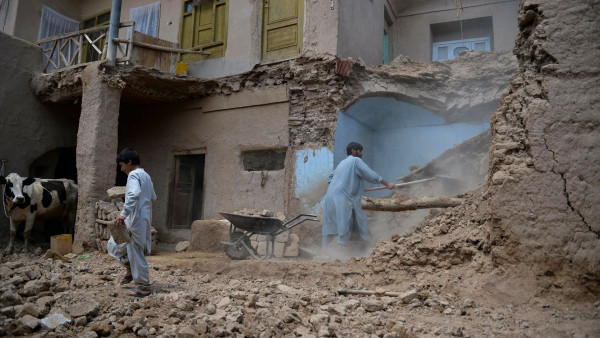Afghanistan is prone to natural disasters, and the United Nations considers it one of the most vulnerable to climate change [GETTY]
At least 50 people are dead following a fresh bout of heavy rain and flooding in central Afghanistan, an official said on Saturday.
Mawlawi Abdul Hai Zaeem, the head of the information department for the central Ghor province, told Reuters that no information was available about how many people were injured in the rain spell that began on Friday. The spell also cut off many key roads in the area.
Zaeem added that 2,000 houses were destroyed, 4,000 partially damaged, and more than 2,000 shops were underwater in the province’s capital, Feroz-Koh.
Last week, flash floods caused by heavy rains devastated villages in northern Afghanistan, killing 315 people and injuring more than 1,600, authorities said on Sunday.
On Wednesday, a helicopter used by the Afghan air force crashed due to “technical issues” during attempts to recover the bodies of people who had fallen into a river in Ghor province, killing one and injuring 12 people, the country’s defence ministry said.
Since mid-April, flash flooding and other floods had left about 100 people dead in 10 of Afghanistan’s provinces, with no region entirely spared, according to authorities.
Farmland has been swamped in a country where 80 percent of the more than 40 million people depend on agriculture to survive.
Afghanistan is prone to natural disasters, and the United Nations considers it one of the most vulnerable to climate change.
The country had a relatively dry winter, making it more difficult for the soil to absorb rainfall and making it highly vulnerable to climate change.
More than 300 dead in Afghanistan flash floods: WFP 👇https://t.co/j72cTP5Yvs
— The New Arab (@The_NewArab) May 11, 2024
The nation, ravaged by four decades of war, is one of the poorest in the world and, according to scientists, one of the worst prepared to face the consequences of global warming.
It has battled a shortfall in aid after the Taliban took over as foreign forces withdrew from the country in 2021 since development aid that formed the backbone of government finances was slashed.
The shortfall has worsened in subsequent years as foreign governments grapple with competing global crises and growing condemnation of the Taliban’s curbs on Afghan women.
(Reuters)

